With the announcement this week that Myrlie Evers-Williams ’68 will give the invocation at President Obama’s inauguration on Jan. 21, it’s worth taking a look back at her time in Claremont.
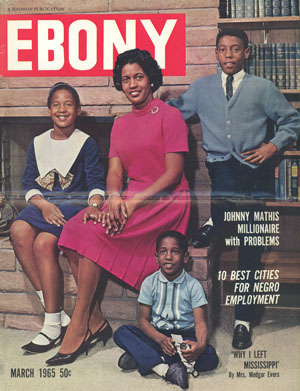 This year marks the 50th anniversary of the assassination of her husband, civil rights activist Medgar Evers, who was shot in the back outside their Jackson, Miss., home on the morning of June 12, 1963, while Myrlie and their three children were inside.
This year marks the 50th anniversary of the assassination of her husband, civil rights activist Medgar Evers, who was shot in the back outside their Jackson, Miss., home on the morning of June 12, 1963, while Myrlie and their three children were inside.
The next year, Evers-Williams decided to move to Claremont, as she recounted in a 1965 piece for Ebony magazine titled “Why I Left Mississippi.” In that piece, she wrote that she found purpose in speaking engagements, but was like the “walking dead” when she returned to her house and the memories. Ultimately, it was the welfare of her children, particularly her oldest son who was nine at the time, that prompted the move:
“They were awake that terrible night, and heard the thunderous roar of the death shot. They saw their father lying in a scarlet pool of blood as his life ebbed away,” she wrote. “… So it was that in the spring of 1964, while on a speaking engagement in California, I asked friends to ‘look around’ for a house for me.”
She chose Claremont, Evers-Williams wrote, for the college town atmosphere, and more specifically because it was home to Pomona College, where she enrolled. Her time in Claremont received widespread media attention — in 1965 alone her life here was featured in Look, Good Housekeeping and in the Ebony magazine cover story, as the Claremont Courier noted in a story about the stories.
Evers-Williams told Look that she had to wake at 3 a.m. to juggle the demands of school, raising kids and writing down her memories of Medgar. “Someone asked me what I wanted for Christmas,” she told the magazine. “I told them: a secretary.”
While still a Pomona student, Evers-Williams wrote a book (with Peter Williams), For Us, the Living. After graduating in sociology in 1968, Evers worked for several years at The Claremont Colleges, starting at the new Center for Educational Opportunity. In 1970, she ran for Congress as a Democrat, losing in the largely Republican district that included Claremont.
She went on to work for ARCO as national director of community affairs, served as a commissioner on the Los Angeles Board of Public Works and, in 1995, she was elected chair of the NAACP’s national board of directors. The next year, Pomona College awarded her an honorary degree and she delivered the Commencement address in Bridges Auditorium, where she had graduated nearly three decades earlier.
 Top 5:
Top 5:
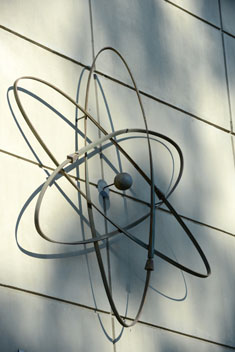 Commissioned for Pomona College’s new math, physics and astronomy lab back in 1958, the bronze atom sculpture facing College Avenue was designed by noted sculptor Albert Stewart, whose work adorns civic buildings nationwide, including the U.S. Mint in San Francisco. Before his death in 1965, Stewart created counterparts for the atom for the facades of Seaver North and South, with an image of cell division for biology and an array of particles for chemistry.
Commissioned for Pomona College’s new math, physics and astronomy lab back in 1958, the bronze atom sculpture facing College Avenue was designed by noted sculptor Albert Stewart, whose work adorns civic buildings nationwide, including the U.S. Mint in San Francisco. Before his death in 1965, Stewart created counterparts for the atom for the facades of Seaver North and South, with an image of cell division for biology and an array of particles for chemistry. Coolest name for a college band: The Inland Emperors. The group formed last fall, and Wes Haas ’15 and Lee Owens-Oas ’15 came up with the moniker during their Physics with Music class. As Haas explains, they were talking about how they now live in the Inland Empire and wondering whether anyone’s ever thought whether “there’s an emperor of the place” and—voilà—the band, which includes three more Sagehens, had its name. What do they play? “Loud rock music,” says Haas. Gigs so far have mostly been on campus, but with a name like that, we’re sure their reign will someday reach all the way to Riverside.
Coolest name for a college band: The Inland Emperors. The group formed last fall, and Wes Haas ’15 and Lee Owens-Oas ’15 came up with the moniker during their Physics with Music class. As Haas explains, they were talking about how they now live in the Inland Empire and wondering whether anyone’s ever thought whether “there’s an emperor of the place” and—voilà—the band, which includes three more Sagehens, had its name. What do they play? “Loud rock music,” says Haas. Gigs so far have mostly been on campus, but with a name like that, we’re sure their reign will someday reach all the way to Riverside. The O.J. flowing in campus dining halls these days doesn’t come from frozen concentrate, nor was it born thousands of miles away in Florida.
The O.J. flowing in campus dining halls these days doesn’t come from frozen concentrate, nor was it born thousands of miles away in Florida. Trees, Ph.D.s and … country? Claremont is a long way from Nashville, but this school year brings two country superstars to
Trees, Ph.D.s and … country? Claremont is a long way from Nashville, but this school year brings two country superstars to  This year marks the 50th anniversary of the assassination of her husband, civil rights activist Medgar Evers, who was shot in the back outside their Jackson, Miss., home on the morning of June 12, 1963, while Myrlie and their three children were inside.
This year marks the 50th anniversary of the assassination of her husband, civil rights activist Medgar Evers, who was shot in the back outside their Jackson, Miss., home on the morning of June 12, 1963, while Myrlie and their three children were inside.
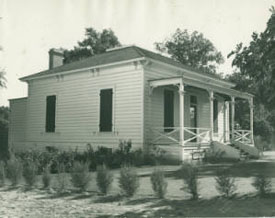 Conceived in 1937 at the College’s 50th anniversary, the house is a two-thirds scale look-alike of Ayer Cottage in the city of Pomona, where the College held its first classes in the spring of 1887.
Conceived in 1937 at the College’s 50th anniversary, the house is a two-thirds scale look-alike of Ayer Cottage in the city of Pomona, where the College held its first classes in the spring of 1887.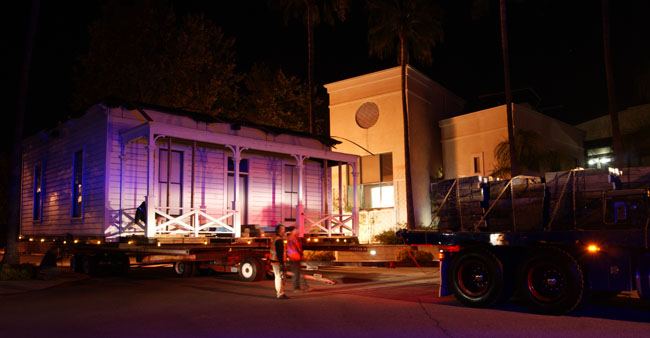
 On the first day of his Critical Inquiry class, Linguistics and Cognitive Science Professor Michael Diercks strolled into the room, looking very much like any other college student, wearing a plain T-shirt and a pair of jeans. He sat down among his students and introduced himself as Michael. After engaging in conversation with his “classmates” about how late the professor was, he finally introduced himself to the class as their teacher. An awkward silence fol- lowed. And then some nervous laughter. What did they expect? This was a class on social awkwardness!
On the first day of his Critical Inquiry class, Linguistics and Cognitive Science Professor Michael Diercks strolled into the room, looking very much like any other college student, wearing a plain T-shirt and a pair of jeans. He sat down among his students and introduced himself as Michael. After engaging in conversation with his “classmates” about how late the professor was, he finally introduced himself to the class as their teacher. An awkward silence fol- lowed. And then some nervous laughter. What did they expect? This was a class on social awkwardness! Before moving on, Pomona’s Class of 2012 first had to move merchandise and shed accessories. So, for weeks before this year’s Commencement, the daily Student Digester turned into a swap meet laden with “SENIOR SALES!” We looked past the expected futons and floor lamps for the finer things, listed here with the original asking price:
Before moving on, Pomona’s Class of 2012 first had to move merchandise and shed accessories. So, for weeks before this year’s Commencement, the daily Student Digester turned into a swap meet laden with “SENIOR SALES!” We looked past the expected futons and floor lamps for the finer things, listed here with the original asking price: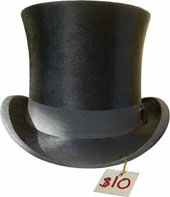 • Chin-up bar: $15
• Chin-up bar: $15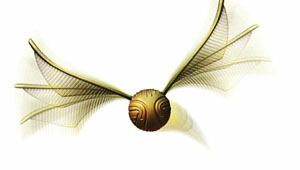 We knew it was coming. For years, we have happened across little items in other colleges’ alumni magazines about students playing Harry Potter-inspired Quidditch matches. Competitors in “Muggle Quidditch” move the ball down the field while holding broomsticks between their legs in a gravity-bound version of the aerial competitions at Hogwarts. In the absence of real magic, the winged and evasive Golden Snitch (above) is replaced by a tennis ball stuffed in a sock and carried in the shorts of a player known as the snitch runner. The Muggle [that is, non-magic] version started at Middlebury in 2005. Now, via the Student Digester, we learn there is a recently-formed team for students of The Claremont Colleges. They call themselves the Dirigible Plums, and they will compete against UCLA, Oxy and others at the Western Cup tournament in March.
We knew it was coming. For years, we have happened across little items in other colleges’ alumni magazines about students playing Harry Potter-inspired Quidditch matches. Competitors in “Muggle Quidditch” move the ball down the field while holding broomsticks between their legs in a gravity-bound version of the aerial competitions at Hogwarts. In the absence of real magic, the winged and evasive Golden Snitch (above) is replaced by a tennis ball stuffed in a sock and carried in the shorts of a player known as the snitch runner. The Muggle [that is, non-magic] version started at Middlebury in 2005. Now, via the Student Digester, we learn there is a recently-formed team for students of The Claremont Colleges. They call themselves the Dirigible Plums, and they will compete against UCLA, Oxy and others at the Western Cup tournament in March.